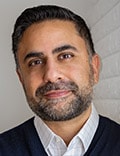When child psychiatrist Javeed Sukhera, MD, PhD, was a few years into his career, he found himself doing it all. "I was in a leadership role academically at the medical school, I had a leadership role at the hospital, and I was seeing as many patients as I could. I could work all day every day."

"It still wouldn't have been enough," he said.
Whenever there was a shift available, Sukhera would take it. His job was stressful, but as a new physician with a young family, he saw this obsession with work as necessary. "I began to cope with the stress from work by doing extra work and feeling like I needed to be everywhere. It was like I became a hamster on a spinning wheel. I was just running, running, running."
Things shifted for Sukhera when he realized that while he was emotionally available for the children who were his patients, at home, his own children weren't getting the best of him. "There was a specific moment when I thought my son was afraid of me," he said. "I just stopped and realized that there was something happening that I needed to break. I needed to make a change."
Sukhera, now chair of psychiatry at the Institute of Living and chief of the Department of Psychiatry at Hartford Hospital, Hartford, Connecticut, believes what he experienced was a steep fall into work addiction. "Workaholism," often dismissed as simply working hard, is a nonclinical addiction that could fall under the umbrella of a behavioral addiction, and healthcare professionals may be especially at risk.
What Does Work Addiction Look Like for Doctors?
Behavioral addictions are fairly new in the addiction space. When gambling disorder, the first and only behavioral addiction in the Diagnostic and Statistical Manual of Mental Disorders, Fifth Edition, was added in 2013, it was seen as a "breakthrough addiction," said Mark Griffiths, PhD, a leading behavioral addiction researcher and a distinguished professor at Nottingham Trent University.

Because there is not enough evidence yet to classify work addiction as a formal diagnosis, there is no clear consensus on how to define it. To further complicate things, the terms "workaholism" and "work addiction" can be used interchangeably, and some experts say the two are not the same, though they can overlap.
That said, a 2018 review of literature from several countries found that work addiction "fits very well into recently postulated criteria for conceptualization of a behavioral addiction."
"If you accept that gambling can be genuinely addictive, then there's no reason to think that something like work, exercise, or video game playing couldn't be an addiction as well," said Griffiths.
"The neurobiology of addiction is that we get drawn to something that gives us a dopamine hit," Sukhera added. "But to do that all day, every day, has consequences. It drains our emotional reserves, and it can greatly impact our relationships."
On top of that, work addiction has been linked with poor sleep, poor cardiovascular health, high blood pressure, burnout, the development of autoimmune disorders, and other health issues.
Javeed Sukhera, MD
We deal with the stress of being burnt out by doing more and more of what burns us out.
Physicians are particularly susceptible. Doctors, after all, are expected to work long hours and put their patients' needs first, even at the expense of their own health and well-being.
"Workaholism is not just socially acceptable in medicine," said Sukhera. "It's baked into the system and built into the structures. The healthcare system has largely functioned on the emotional labor of health workers, whose tendency to show up and work harder can, at times, in certain organizations, be exploited."
Griffiths agreed that with the limited amount of data available, work addiction does appear to exist at higher rates in medicine than in other fields. As early as the 1970s, medical literature describes work as a "socially acceptable" addiction among doctors. A 2014 study published in Occupational Medicine also reported that of 445 physicians who took part in the research, nearly half exhibited some level of work addiction with 13% "highly work addicted."
Of course, working hard or even meeting unreasonable demands from work is not the same as work addiction, as Griffiths clarified in a 2023 editorial in BMJ Quality & Safety. The difference, as with other behavioral addictions, is when people obsess about work and use it to cope with stress. It can be easier to stay distracted and busy to gain a sense of control rather than learning to deal with complex emotions.
A 2021 study that Sukhera conducted with resident physicians found that working harder was one of the main ways they dealt with stress during the COVID-19 pandemic. "This idea that we deal with the stress of being burnt out by doing more and more of what burns us out is fairly ubiquitous at all stages of medical professionals' careers," he said.
Financial incentives can also fuel work addiction, said Sukhera. In residency, there are some safeguards around overwork and duty hours. When you become an attending, those limits no longer exist. As a young physician, Sukhera had student debt to pay off and a family to support. When he found opportunities to earn more by working more, his answer was always "yes."
Pressure to produce medical research can also pose issues. Some physicians can become addicted to publishing studies, fearing that they might lose their professional status or position if they stop. It's a cycle that can force a doctor to not only work long hours doing their job but also practically take on a second one.
How Physicians Can Recognize Work Addiction in Themselves
Work addiction can look and feel different for every person, said Malissa Clark, PhD, an associate professor at the University of Georgia and author of the recent book Never Not Working: Why the Always-On Culture Is Bad for Business—and How to Fix It.

Clark noted that people who are highly engaged in their work tend to be driven by intrinsic motivation: "You work because you love it." With work addiction, "you work because you feel like you ought to be working all the time."
Of course, it's not always so cut-and-dried; you can experience both forms of motivation and not necessarily become addicted to work. But if you are solely driven by the feeling that you ought to be working all the time, that can be a red flag.
Griffiths said that while many people may have problematic work habits or work too much, true work addicts must meet six criteria that apply to all addictions:
- Salience: Work is the single most important thing in your life, to the point of neglecting everything else. Even if you're on vacation, your mind might be flooded with work thoughts.
- Mood modification: You use work to modify your mood, either to get a "high" or to cope with stress.
- Tolerance: Over time, you've gone from working eight or 10 hours a day to 12 hours a day, to a point where you're working all the time.
- Withdrawal: On a physiological level, you will have symptoms such as anxiety, nausea, or headaches when unable to work.
- Conflict: You feel conflicted with yourself (you know you're working too much) or with others (partners, friends, and children) about work, but you can't stop.
- Relapse: If you manage to cut down your hours but can't resist overworking 1 day, you wind up right back where you were.
When It's Time to Address Work Addiction
The lack of a formal diagnosis for work addiction makes getting treatment difficult. But there are ways to seek help. Unlike the drug and alcohol literature, abstinence is not the goal. "The therapeutic goal is getting a behavior under control and looking for the triggers of why you're compulsively working," said Griffiths.
Practice self-compassion
Sukhera eventually realized that his work addiction stemmed from the fear of being somehow excluded or unworthy. He actively corrected much of this through self-compassion and self-kindness, which helped him set boundaries. "Self-compassion is the root of everything," he said. "Reminding ourselves that we're doing our best is an important ingredient in breaking the cycle."
Slowly expose yourself to relaxation
Many workaholics find rest very difficult. "When I conducted interviews with people [who considered themselves workaholics], a very common thing I heard was, 'I have a very hard time being idle,'" said Clark. If rest feels hard, Sukhera suggests practicing relaxation for 2 minutes to start. Even small periods of downtime can challenge the belief that you must be constantly productive.
Reframe your to-do list
For work addicts, to-do lists can seem like they must be finished, which prolongs work hours. Instead, use to-do lists to help prioritize what is urgent, identify what can wait, and delegate out tasks to others, Clark recommends.
Pick up a mastery experience
Research from professor Sabine Sonnentag at the University of Mannheim, Mannheim, Germany, suggests that mastery experiences — leisure activities that require thought and focus like learning a new language or taking a woodworking class — can help you actively disengage from work.
Try cognitive behavioral therapy
Widely used for other forms of addiction, cognitive behavioral therapy centers around recognizing emotions, challenging thought patterns, and changing behaviors. However, Clark admits the research on its impact on work addiction, in particular, is "pretty nascent."
Shift your mindset
It seems logical to think that detaching from your feelings will allow you to "do more," but experts say that idea is both untrue and dangerous. "The safest hospitals are the hospitals where people are attuned to their humanness," said Sukhera. "It's normal to overwork in medicine, and if you're challenging a norm, you really have to be thoughtful about how you frame that for yourself."
Most importantly: Seek support. Today, there is increased awareness about work addiction and more resources for physicians who are struggling, including programs such as Workaholics Anonymous or Physicians Anonymous and workplace wellness initiatives. But try not to overwhelm yourself with choosing whom to talk to or what specific resource to utilize, Sukhera advised. "Just talk to someone about it. You don't have to carry this on your own."

